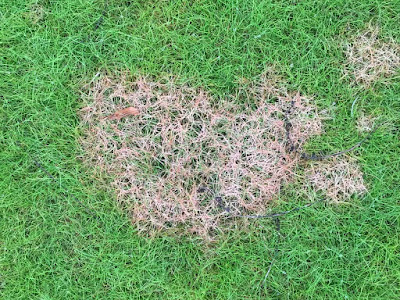The diagnosis at this time of the year is usually the following: Red Thread, Dollar Spot, Leaf Spot, Brown Patch and other Blights.
The cause can range from a variety of reasons or a combination of these: humidity & heat, dull mower blades, improper cutting, or watering any other time than early morning.
The treatment, since fungicides are off the table, and have been for a number of years, we must turn to cultural practices.
As mentioned, water in the mornings only, twice a week for an hour each time. This will allow the grass to dry evenly and stop the rise of turf diseases where the grass blades begin to melt-out.
Keep your grass at 3 1/2 inches in height and when you cut make sure the blades are sharp. Never remove more than a third of the blade from the grass. In some cases it may be advised to bag the clipping to avoid the spread of the disease.
Use a fertilizer that won't burn your lawn in current high temperatures. This will allow the the problem to grow out and the turf to correct under-nourished areas.
Whatever the affliction, be assure, grass is resilient and will bounce back when temperatures normalize. You need to have faith and a little patience to get you through. This is your script, now go fill it.





.jpg)


